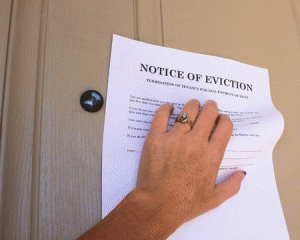Accurate Serve Charlotte
Can You Serve Court Papers to Someone in Jail?
 Navigating the legal system can be complex, especially when it comes to serving court papers to someone who is currently incarcerated. In North Carolina and South Carolina, there are specific procedures that must be followed to ensure that the service of process is conducted legally and effectively. In this post, we will guide you through the steps involved in the serving process for someone in jail.
Navigating the legal system can be complex, especially when it comes to serving court papers to someone who is currently incarcerated. In North Carolina and South Carolina, there are specific procedures that must be followed to ensure that the service of process is conducted legally and effectively. In this post, we will guide you through the steps involved in the serving process for someone in jail.
Understanding Service of Process in the Carolinas
Service of process is the procedure by which a party to a lawsuit gives appropriate notice of initial legal action to another party, court, or administrative body, so that the person can respond to the proceeding in a timely manner. When the individual to be served is in jail, the process can become more complex. In both North Carolina and South Carolina, the sheriff of the county where the inmate is incarcerated must perform the service of process. Continue reading
Comprehensive Guide to Process of Service
 Service of process is a fundamental part of the U.S. legal system, ensuring that legal proceedings are conducted fairly and upholding due process. At Accurate Serve of Charlotte, we recognize the importance of quality process service to ensure the integrity of our courts and fairness to all parties involved. This guide provides a comprehensive overview of the service of process and its operations here in the Queen City.
Service of process is a fundamental part of the U.S. legal system, ensuring that legal proceedings are conducted fairly and upholding due process. At Accurate Serve of Charlotte, we recognize the importance of quality process service to ensure the integrity of our courts and fairness to all parties involved. This guide provides a comprehensive overview of the service of process and its operations here in the Queen City.
Understanding Service of Process
Service of process involves delivering legal documents—such as summons, complaints, subpoenas, and writs—to individuals or entities involved in legal proceedings. This process ensures all parties are informed of the legal actions against them, allowing them to respond, prepare a defense, or produce requested evidence. Continue reading
What You Need to Know About Serving Papers to Family Members
 If you’ve filed a lawsuit naming one of your own family members as a defendant, they’ll need to be served with the official court process. While the logistics of serving a family member are the same as anyone else, the situation can feel a bit complicated. In this post, we’ll go over the best practices for serving process to a family member in North or South Carolina.
If you’ve filed a lawsuit naming one of your own family members as a defendant, they’ll need to be served with the official court process. While the logistics of serving a family member are the same as anyone else, the situation can feel a bit complicated. In this post, we’ll go over the best practices for serving process to a family member in North or South Carolina.
What the Law Says
In North Carolina, it depends on what type of process you need served. If it’s a subpoena, you will have the option of using a private process server “duly authorized by law” or local law enforcement. If it is any other type of process, local law enforcement must make the first service attempt, after which you may choose to use a private, duly authorized process server. Process served by someone not authorized by law in NC will be deemed invalid and could give the defendant grounds to request that the case be delayed or dismissed. In South Carolina, anyone who is over 18 years old, not an attorney, and not a party to the case may serve the process. Just like in NC, allowing someone to serve process in SC who does not meet the legal requirements will risk the service being deemed invalid. Continue reading
What is the Safest Way to Serve Court Papers?
 If you’re a process server, you’ve probably run into your fair share of sketchy situations. From high-crime areas to nighttime service attempts, process servers can often have quite a dangerous job. That’s why it’s so important for process servers to always consider not just their own safety while working, but also the safety of everyone in the vicinity. In this post, we’ll go through our top tips for safely serving process here in the Carolinas and beyond.
If you’re a process server, you’ve probably run into your fair share of sketchy situations. From high-crime areas to nighttime service attempts, process servers can often have quite a dangerous job. That’s why it’s so important for process servers to always consider not just their own safety while working, but also the safety of everyone in the vicinity. In this post, we’ll go through our top tips for safely serving process here in the Carolinas and beyond.
Consider the Situation
While it’s not a process server’s business to keep up with the legal affairs of everyone they serve, sometimes knowing the type of papers being served can be vital. For example, if you’re serving divorce or child custody papers, planning the service when the spouse or children are not present is the best method. For evictions or foreclosures, emotions can also run high, so approaching in a calm demeanor with de-escalation tactics on hand is key. This will hopefully avoid any spur of the moment violent reaction towards yourself or the other parties involved. Continue reading
What are the Federal Rules for Service of Process?
 Navigating the legal system is quite complicated, but did you know that there are a separate set of laws and rules for federal and state civil cases? That’s right…it all depends on which has jurisdiction over the case and defendants. In both federal and state cases, parties are notified of upcoming court matters via service of process, or the delivery of a formal notice that a case has been filed. This notice includes the summons and complaint for the case along with any other relevant documentation. All these documents together are collectively known as process, and process must be delivered in strict accordance with federal or state laws in order to be valid. If process is not served in a valid manner, the entire case will be delayed at best and dismissed at worst. In this post, we’ll discuss the basics of the federal rules for service of process, which are applicable all over the U.S., including here in the Carolinas.
Navigating the legal system is quite complicated, but did you know that there are a separate set of laws and rules for federal and state civil cases? That’s right…it all depends on which has jurisdiction over the case and defendants. In both federal and state cases, parties are notified of upcoming court matters via service of process, or the delivery of a formal notice that a case has been filed. This notice includes the summons and complaint for the case along with any other relevant documentation. All these documents together are collectively known as process, and process must be delivered in strict accordance with federal or state laws in order to be valid. If process is not served in a valid manner, the entire case will be delayed at best and dismissed at worst. In this post, we’ll discuss the basics of the federal rules for service of process, which are applicable all over the U.S., including here in the Carolinas.
Understanding the Federal Rules of Civil Procedure
The Federal Rules of Civil Procedure (FRCP) detail the exact rules for civil cases heard in federal courts. The FRCP are designed to ensure that federal civil cases are fair, efficient, and just. Rule 4 of the FRCP specifically addresses service of process for these cases. Continue reading
Reasons for a Motion to Dismiss for Insufficiency of Service of Process
 Service of process is an essential part of the legal process, notifying those named in a legal matter of their involvement, the accusations, and their upcoming court date. It is necessary for the service of process to be done correctly for it to be considered valid. If it is not done correctly, it can give the defendant a reason to request dismissal of the entire case, in which case the entire process would have to be restarted. In this post, we’ll go over the different things that can go wrong with service of process, rendering it invalid and setting the defense up for a motion to dismiss.
Service of process is an essential part of the legal process, notifying those named in a legal matter of their involvement, the accusations, and their upcoming court date. It is necessary for the service of process to be done correctly for it to be considered valid. If it is not done correctly, it can give the defendant a reason to request dismissal of the entire case, in which case the entire process would have to be restarted. In this post, we’ll go over the different things that can go wrong with service of process, rendering it invalid and setting the defense up for a motion to dismiss.
What is Service of Process?
As mentioned above, service of process involves formally notifying everyone named in a court case about the filing of the case, the grounds for the case, and when it is to be heard in court. This notification is required by both federal and state laws, and is even discussed in due process clauses of the U.S. Constitution. For the service of process to be valid, the documents related to the case, known as process, must be delivered in accordance with state laws where the process is being served. If the law is not followed to the letter, trouble could be down the road. Continue reading
Understanding The Legal Ethics in Process Service
 The U.S. legal system is a complex and nuanced beast, requiring expert knowledge and understanding to navigate its waters efficiently and effectively. However, many people attempt to take shortcuts while dealing with legal issues, making ethically questionable choices to get a better outcome for their case without putting in the work required to truly understand the inner workings of the law. This intentional evasion of ethical requirements is a sure way to land you in hot water with the court, as judges and court officials take great pride in operating ethically to uphold their oaths as part of their offices. At Accurate Serve of Charlotte, the ethical operation is the only way we know. The legal consequences of skirting around ethics are simply too great to take the risk for ourselves or our clients, so we work tirelessly to uphold the ethical principles that make our legal system one of the best in the world. In this post, we’ll go over the basics of ethics in process serving here in the Carolinas. Continue reading
The U.S. legal system is a complex and nuanced beast, requiring expert knowledge and understanding to navigate its waters efficiently and effectively. However, many people attempt to take shortcuts while dealing with legal issues, making ethically questionable choices to get a better outcome for their case without putting in the work required to truly understand the inner workings of the law. This intentional evasion of ethical requirements is a sure way to land you in hot water with the court, as judges and court officials take great pride in operating ethically to uphold their oaths as part of their offices. At Accurate Serve of Charlotte, the ethical operation is the only way we know. The legal consequences of skirting around ethics are simply too great to take the risk for ourselves or our clients, so we work tirelessly to uphold the ethical principles that make our legal system one of the best in the world. In this post, we’ll go over the basics of ethics in process serving here in the Carolinas. Continue reading
The Importance of Timeliness in Process Serving
 Delivering legal documents on time to the correct person(s) or business isn’t just a nicety…it’s the law. At Accurate Serve of Charlotte, we know how important it is to be timely in all areas of process serving. We serve process in both North Carolina and South Carolina, specializing in timely, professional service that meets all legal requirements. You’ll never have to worry about late service derailing your case when you choose Accurate Serve!
Delivering legal documents on time to the correct person(s) or business isn’t just a nicety…it’s the law. At Accurate Serve of Charlotte, we know how important it is to be timely in all areas of process serving. We serve process in both North Carolina and South Carolina, specializing in timely, professional service that meets all legal requirements. You’ll never have to worry about late service derailing your case when you choose Accurate Serve!
The Legality of Timely Process Service
Timeliness in process serving is required by both federal and state laws. Federal Rules of Civil Procedure, Rule 4, specifies that a defendant must be served within 90 days after the complaint has been filed in federal court. This rule provides a clear timeframe to ensure that the legal process is not hindered by delays, but this only applies to federal court cases. Each state has their own set of laws governing deadlines on process service. Continue reading
The Importance of Client Confidentiality & Privacy in Process Serving
 Process servers provides an essential legal support service, without which the entire court schedule would become backlogged and stagnant. By fulfilling this pivotal role, process servers ensure that legal cases are able to move forward in a timely manner, upholding various aspects of due process, which is guaranteed to Americans under the U.S. Constitution. However, due process isn’t the only legal requirement process servers must abide by…they must also ensure that client confidentiality and privacy is always respected. In this post, we’ll discuss the importance of client confidentiality and privacy as it relates to legal ethics and ways process servers can be sure they’re operating within the bounds of all applicable laws. Continue reading
Process servers provides an essential legal support service, without which the entire court schedule would become backlogged and stagnant. By fulfilling this pivotal role, process servers ensure that legal cases are able to move forward in a timely manner, upholding various aspects of due process, which is guaranteed to Americans under the U.S. Constitution. However, due process isn’t the only legal requirement process servers must abide by…they must also ensure that client confidentiality and privacy is always respected. In this post, we’ll discuss the importance of client confidentiality and privacy as it relates to legal ethics and ways process servers can be sure they’re operating within the bounds of all applicable laws. Continue reading
Legal Skip Tracing Techniques
 If you’ve ever had to track down someone who didn’t want to be found, you’ve probably at least heard of skip tracing. Skip tracing is a collection of techniques used to find individuals that cannot be located via typical means, for whatever reason, but it is usually so that they can be served with legal paperwork known as process. By efficiently locating elusive individuals, agencies like Accurate Serve of Charlotte helps streamline the justice system and stop cases from becoming backlogged on the court schedule. In this post, we’ll go over some of the most popular skip-tracing techniques we use here in the Carolinas.
If you’ve ever had to track down someone who didn’t want to be found, you’ve probably at least heard of skip tracing. Skip tracing is a collection of techniques used to find individuals that cannot be located via typical means, for whatever reason, but it is usually so that they can be served with legal paperwork known as process. By efficiently locating elusive individuals, agencies like Accurate Serve of Charlotte helps streamline the justice system and stop cases from becoming backlogged on the court schedule. In this post, we’ll go over some of the most popular skip-tracing techniques we use here in the Carolinas.
What is Skip Tracing?
Skip tracing is the process of scouring over public and private records to attempt to track down someone who cannot otherwise be located. Process servers, law enforcement, debtors and banks, property management companies, and more all rely on skip tracing in the course of their businesses. Continue reading
